Eurocom P5 Pro / Clevo P750ZM Review: True DTR
by Jarred Walton on March 10, 2015 10:00 AM ESTClevo P750ZM General Performance
General performance on high-end notebooks and laptops doesn’t usually add much to the performance story, but in this case we’re actually able to see what happens when we pit the fastest current mainstream desktop CPU against other mobile solutions. I’d love to have numbers from the i7-4860HQ as well as the i7-4710HQ, as that would obviously close the gap, but given the i7-4790K is priced roughly the same as an i7-4710HQ/4710MQ, you should get more bang for the buck.
Here’s a look at our standard CPU and system benchmarks, along with 3DMark for reference; WiFi performance is also included near the bottom of the page. Note that the MSI GT70 and GE60 were both equipped with hard drives for storage, so that will affect some of the PCMark results in particular.
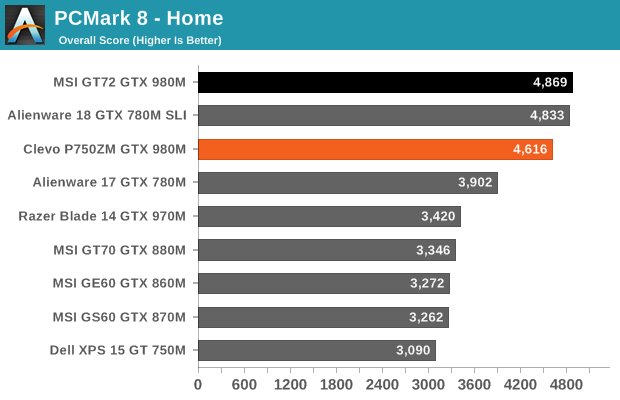
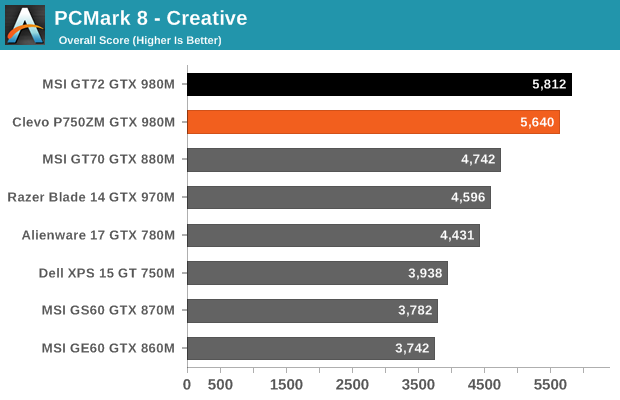
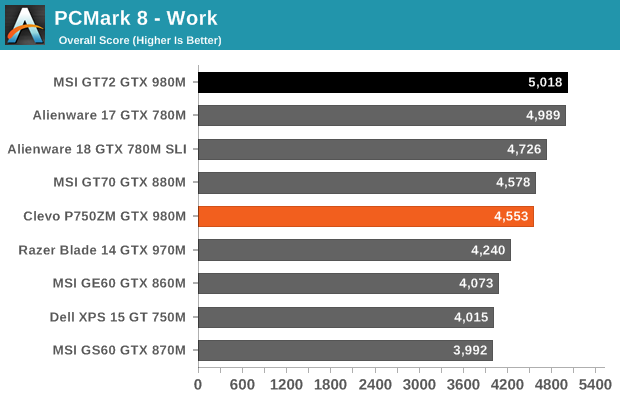
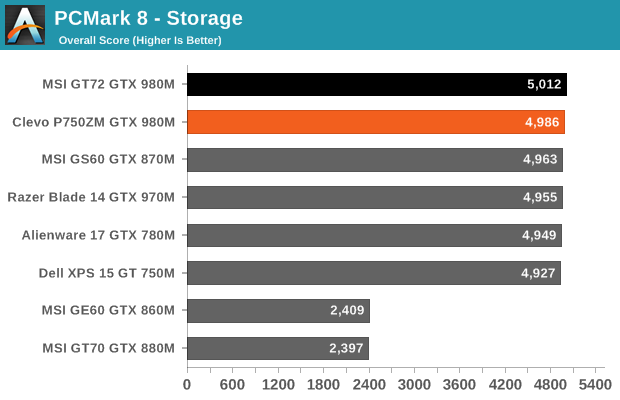
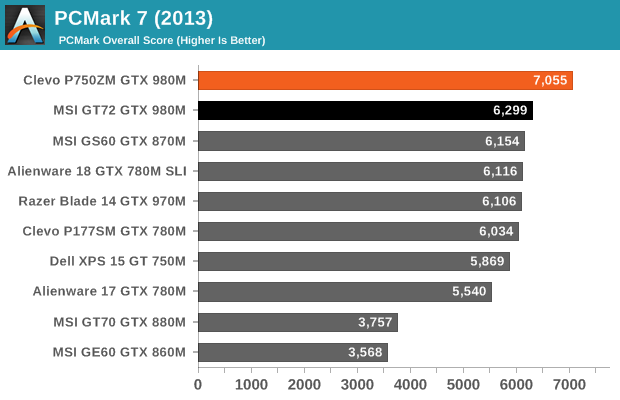
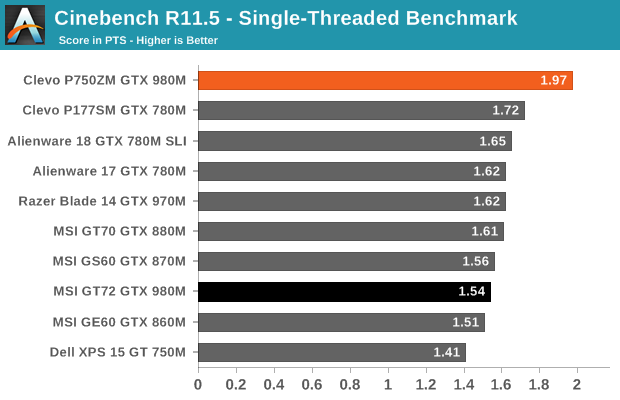
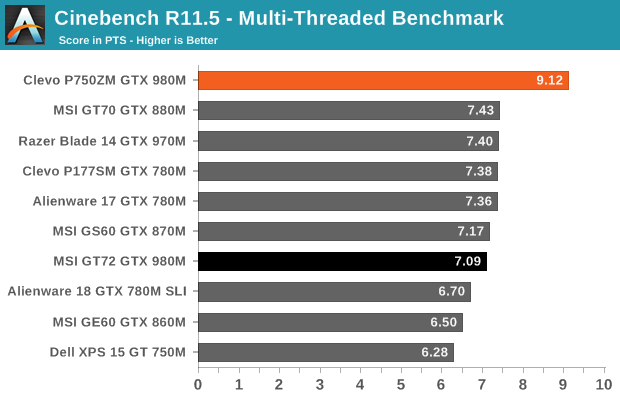
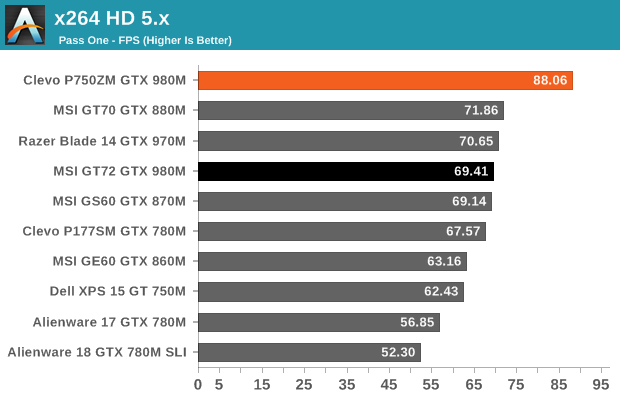
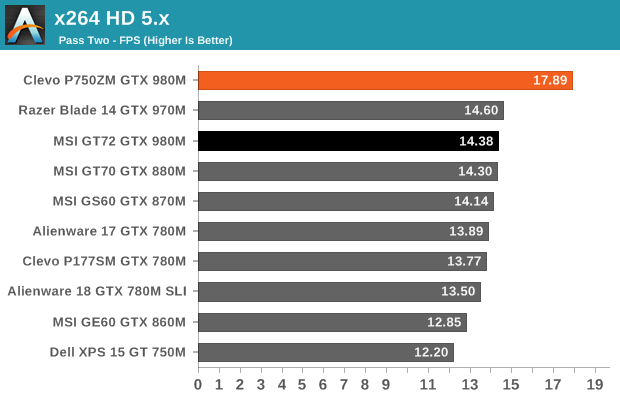
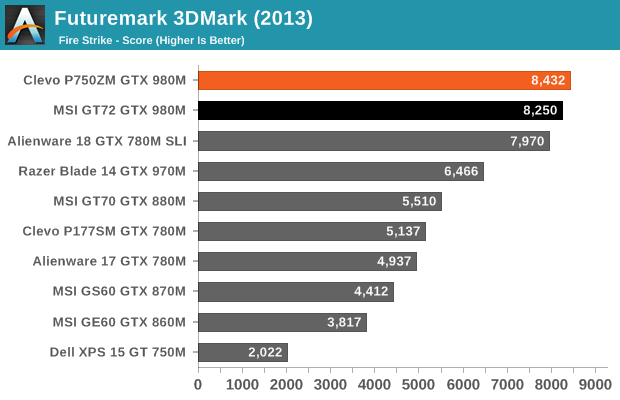
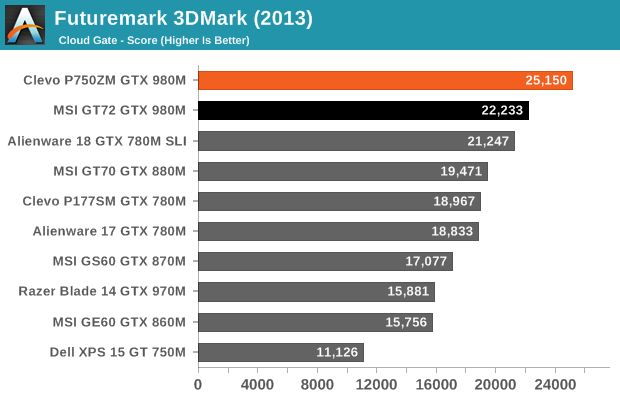
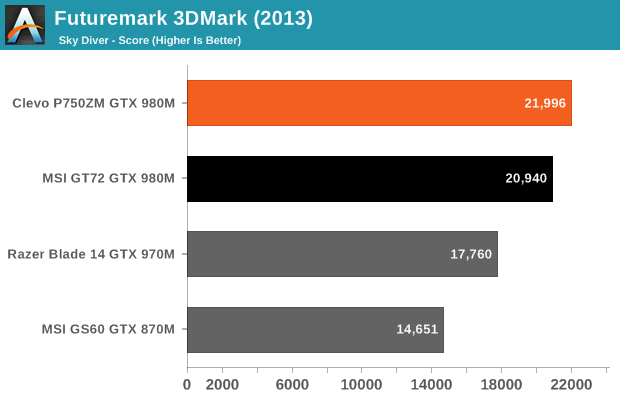
There are no surprises here: the P750ZM with a Core i7-4790K is basically the fastest notebook we’ve tested. A hex-core or octal-core LGA2011 chip could win out in multi-threaded scenarios, but that’s not really going to push gaming performance any higher, and even mobile workstations may not really need more than four cores. There are individual tests where the P750ZM doesn’t place first, but those are often influenced by other factors – e.g. faster quad-RAID SSD storage or access to Intel’s Quick Sync. When we get to CPU-centric testing, however, there’s no competition from the mobile parts; Cinebench and x264 encoding show a solid 20-25% improvement in performance over the next fastest processor.
Interestingly, in 3DMark we again see the combination of desktop CPU with GTX 980M typically outperforms the 780M SLI setup in the Alienware 18. SLI puts a heavier load on the CPU to begin with, so it makes sense that the Kepler mobile parts in SLI are unable to keep up. SLI GTX 980M would obviously change things, but we haven’t had such a system in for testing yet.
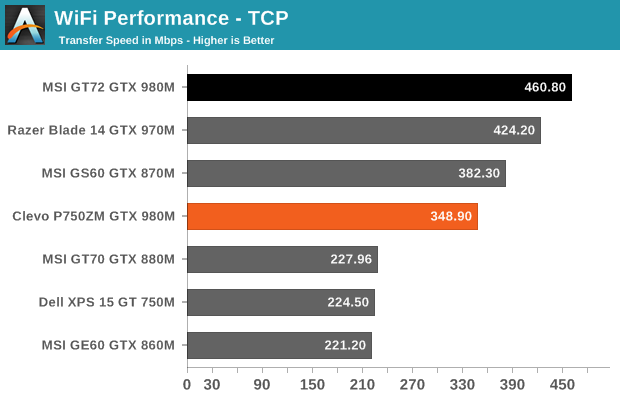
As for wireless performance, the dual-band Killer 1525 802.11ac solution worked fine during testing. We’re still not at the point where WiFi can actually outperform GbE, but for short distances we’re at least getting closer. It’s also worth mentioning that WiFi testing can be highly variable, even in the same location. Both the MSI GT72 and P750ZM used the same WiFi adapter, so either there are differences in the antenna that caused a drop in throughput or else the change in environmental conditions had an impact. This is another reason wired connections are often still desirable.










74 Comments
View All Comments
JarredWalton - Tuesday, March 10, 2015 - link
http://ark.intel.com/products/80807/Intel-Core-i7-...And yes, there are non-desktop CPU notebooks from Clevo, though they're not identical to the P750ZM. The Eurocom M5 Pro is based on the Clevo P650SE chassis and has specs similar to the Gigabyte P35W v3 -- Optimus (I believe), i7-4710HQ, GTX 980M.
http://www.eurocom.com/ec/configure(2,257,0)ec
will54 - Wednesday, March 11, 2015 - link
though I think the P650 solders there cpu and gpu on the mainboard so there is a tradeoff.Khenglish - Tuesday, March 10, 2015 - link
The reason why this laptop exists is because Intel is no longer selling socketed mobile processors. MSI, Alienware, and ASUS all went full BGA cpus for their entire lineup. Clevo did this for most laptops, but has this laptop to corner the entire socketed market all to itself.The only issue I see with this is the heatspreader. Haswell's heatspreader is not good at all, and this shows in the CPU vs GPU temps. In the P750zm there is a heatpipe connecting the GPU and CPU heatsinks, so a difference of more than ~10C should never happen.
JarredWalton - Tuesday, March 10, 2015 - link
Keep in mind that i7-4790K is technically Devil's Canyon, and part of the difference was a change in the Thermal Interface Material:http://www.anandtech.com/show/8227/devils-canyon-r...
Stuka87 - Tuesday, March 10, 2015 - link
The 4790K is an 88W chip. The 4790S is a 3.2GHz part. The 4790K is a 4GHz part. The 4790K is a desktop chip, not a mobile chip.Samus - Tuesday, March 10, 2015 - link
The i5-4690k and i7-4790k are 88w parts. The previous "non devils canyon" parts (4670k, 4770k) were 84w. The "Xeon" equivalent of these chips, ie, the E3-1230v3, is 80w.That is TDP. It doesn't mean the chips use 88w. It simply means they are manufactured to handle a higher temperature (tweaked power delivery on the packaging, better thermal insulation, etc) and even if not overclocked, this means they will turbo up to higher frequencies and for longer periods of time.
And considering the IGP isn't even being used (that's 1/4th the die area of Haswell) there is a lot of cooling headroom since many transistors aren't even being used. Typically these chips will use around 70w at stock load without the IGP enabled.
warmon6 - Wednesday, March 11, 2015 - link
Er... the desktop 4790k is 88W.And for dekstop-replacement laptops this is pretty tame vs the LGA 1366 desktop cpu that were in these kinds of laptop's when I last payed attention to them and last i remember all the core i7 1366 cpu's were 130W chips.
(and I would easly guess there are LGA 2011 and 2011-3 base laptops as well out there.)
hyno111 - Tuesday, March 10, 2015 - link
I'm waiting to see how 65w broadwell CPU performs on this beast...JarredWalton - Tuesday, March 10, 2015 - link
You'll need a new chipset and motherboard, so it will probably be in the P751ZM or something like that. From what I've seen, Broadwell will be about 5% faster at the same clocks compared to Haswell.Telemachus13 - Wednesday, March 11, 2015 - link
Why would a new chipset be needed? It was my understanding that Z97 supported Broadwell.Also, P751ZM is already the name of the European version.